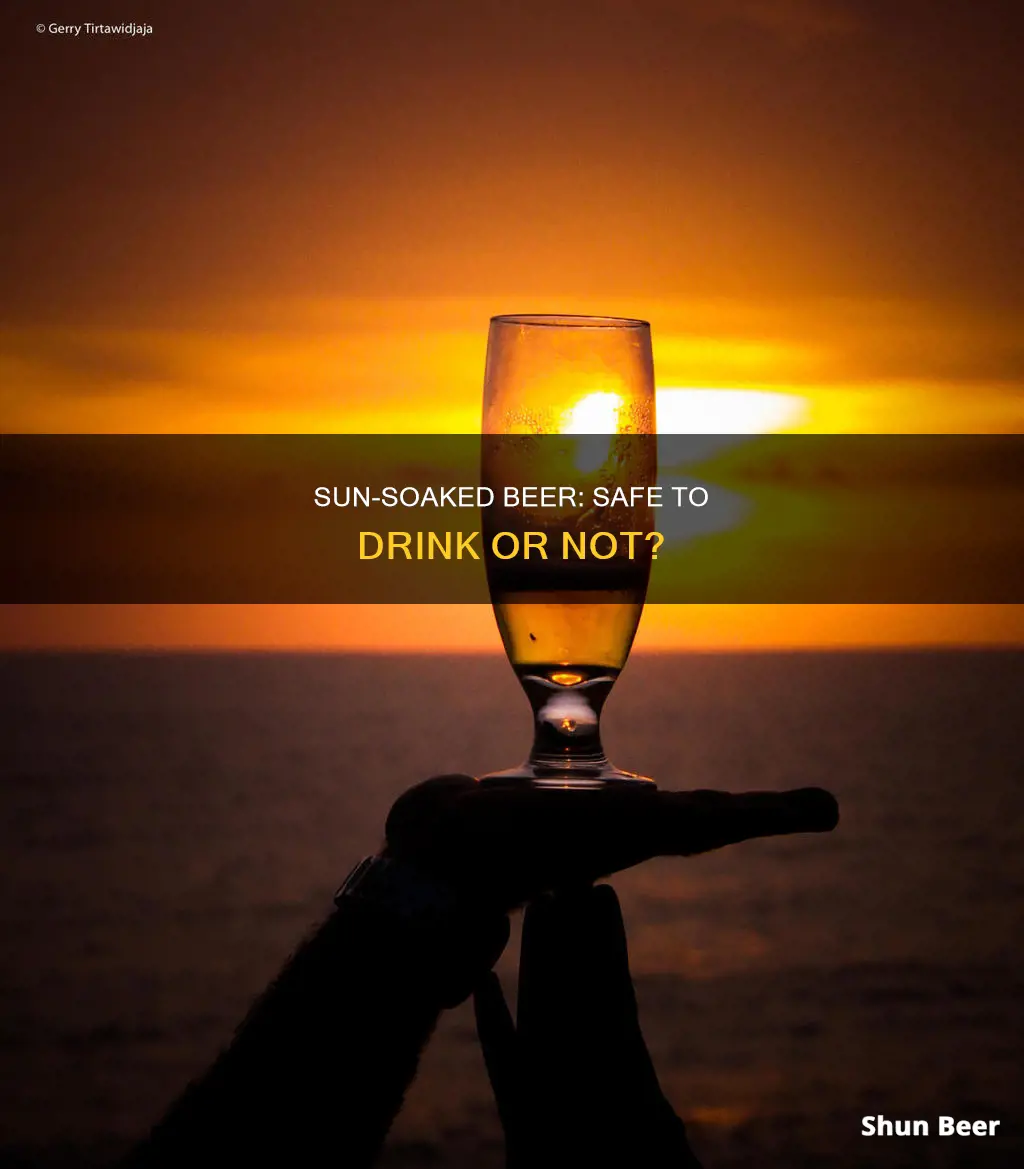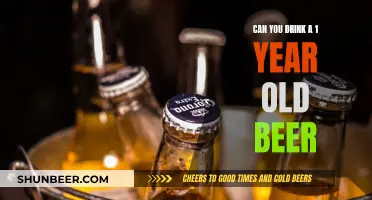
Drinking in the sun is a popular pastime for many, but it's important to be aware of the risks. While beer left out in the sun is safe to drink, it can be unpleasant due to the impact of the sun's ultraviolet rays and heat on the hops and malt. This can cause chemical reactions, resulting in undesirable flavours such as a skunky or sulphuric taste and a loss of hop aroma. These changes happen faster at higher temperatures, with an opened beer going bad in direct sunlight on a hot day in as little as 15 minutes.
In addition to the impact on the beer itself, drinking alcohol in the sun can also affect your body. Alcohol and sun exposure can both cause dehydration, and the combination may lead to heat illness and an increased risk of sunburn. It's important to drink responsibly and be mindful of the potential dangers when enjoying a beer in the sun.
| Characteristics | Values |
|---|---|
| Is it safe to drink? | Yes, but it may have an unpleasant taste. |
| How does the sun affect beer? | The sun's UV rays interact with the essential oils of hops, creating a skunk-like smell and causing the beer to taste stale. |
| How long does it take for beer to be affected by the sun? | An opened beer can be affected in as little as 15 minutes in direct sunlight on a hot day. In cooler conditions, it may take 1-2 hours. |
| What type of beer is most affected by the sun? | Pale beers, particularly IPAs and NEIPAs, are the most affected by the sun due to their higher hop content and paler colour. |
| How to prevent sun damage to beer? | Store beer indoors, use cans or UV-blocking bottles, wrap in towels or koozies, use opaque cups, seek shade, and drink soon after opening. |
| Risks of drinking beer in the sun | Dehydration, heat illness, sunburn, boating and car accidents. |
What You'll Learn

Beer exposed to sunlight can develop a skunk-like smell
The skunk-like smell is just one of several negative effects that sunlight can have on beer. Sunlight can also cause a loss of hop aroma, as the aromatic hop oils that give beer its fresh taste break down when exposed to light. In addition, heating and light accelerate oxidation, which leads to stale flavours in beer. These chemical changes happen faster at higher temperatures, so beer left out in the sun will deteriorate more quickly than beer kept in cooler, shaded conditions.
The type of beer also makes a difference in how susceptible it is to skunking. Darker beers, such as stouts and porters, are less likely to be affected by sunlight because they absorb a wider spectrum of light. On the other hand, pale beers, particularly IPAs and NEIPAs, are more vulnerable to skunking due to their higher hop content and lighter colour. The type of container the beer is in can also affect how quickly it skunks, with canned beer being more resistant to skunking than bottled beer.
To prevent beer from developing a skunk-like smell when exposed to sunlight, it is recommended to keep it in the shade, prioritise canned beer over bottled, and choose darker beers that are less likely to be affected by light.
Ireland's Green Beer: Fact or Fiction?
You may want to see also

Beer exposed to sunlight can develop a sulfuric or cabbage-like smell
Beer exposed to sunlight for a prolonged period can develop a sulfuric or cabbage-like smell. This is due to a chemical reaction between the UV rays and the hops and malt in the beer, which results in a skunky or sulfuric off-flavor. This process can occur very quickly, with an opened beer going bad in as little as 15 minutes in direct sunlight on a hot day. Even a minute of sun exposure can be enough to start producing noticeable skunky flavors.
The UV rays from the sun interact with the essential oils of hops, creating chemical compounds that give off a skunk-like smell. This is why beer that has been left out in the sun is often described as "skunked." The heat from the sun also plays a role in accelerating the chemical reactions that stale the flavor of the beer.
The degradation of the aromatic hop oils that give beer its fresh taste is caused by both UV rays and visible light. Even cool fluorescent lighting can warm the beer enough to gradually cause staling. However, direct sunlight can heat the beer by dozens of degrees in just a few minutes, greatly hastening oxidation and the development of stale flavors.
While beer exposed to sunlight may develop a sulfuric or cabbage-like smell, it is still safe to consume. However, it is important to note that the quality and flavor of the beer will be significantly impacted, resulting in an unpleasant taste.
To prevent beer from being affected by sunlight, it is recommended to store unopened beer indoors, in a cool and dark place, and to prioritize canned beer or bottles that specifically block UV rays.
Beer and Seizures: Is There a Link?
You may want to see also

Beer exposed to sunlight can develop a stale taste
The speed at which beer goes stale in the sun depends on various factors, including the type of beer, the colour of the bottle, and the temperature. For example, an opened beer can go bad in as little as 15 minutes when left in direct sunlight on a hot day, whereas an unopened beer in a can may take several hours.
The type of beer also makes a difference, with darker brews being less affected by sunlight than lighter, hoppier beers. This is because darker beers absorb a wider spectrum of light, whereas pale beers, particularly IPAs, are more susceptible to UV rays.
The colour of the bottle also plays a role, with clear glass offering no protection from UV rays, green glass blocking 30-40%, amber glass blocking 60-70%, and brown glass blocking 80-90%.
Overall, while it may take different amounts of time, any beer left in the sun for too long will eventually develop a stale taste.
Keto Diet and Beer: Is It Possible to Enjoy Both?
You may want to see also

Beer exposed to sunlight can be safely consumed
It is safe to drink beer exposed to sunlight, but it is not recommended, as the quality and taste of the beer will be affected. Beer exposed to sunlight will not make you sick, but it will not taste good.
The sun causes beer to go bad quickly due to the ultraviolet rays and heat from sunlight, which can cause chemical reactions in the hops and malt, making the beer taste unpleasant. This process is known as "skunking" and results in a skunky or sulfur-like smell and taste. These chemical changes happen faster at higher temperatures, so a beer left out on a hot, sunny day will deteriorate much quicker than one left in cooler, shaded conditions.
An opened beer can go bad in as little as 15 minutes when left in direct sunlight on a hot day, developing undesirable flavours. Unopened beers fare better, but the taste still suffers after several hours in the sun. The duration of exposure also depends on the type of beer. Darker brews tend to be less affected by sunlight as they absorb a wider spectrum of light and are less bitter. Lighter, hoppier beers without strong malt backing suffer the most.
To prevent beer from going bad in the sun, it is best to store unopened beer indoors and out of direct sunlight. Canned beer or bottles that specifically block UV rays should be chosen for maximum sun protection. If drinking outdoors, it is best to finish opened beers within an hour or less and to seek shade to keep sunlight off the beer. Wrapping opened beers in towels or koozies can also help to insulate and block light exposure.
Beer Fests in Illinois: Unlimited Drinks or Not?
You may want to see also

Beer exposed to sunlight can be re-chilled and consumed
Sunlight and heat can cause beer to go bad quickly. The ultraviolet rays from the sun can cause chemical reactions in the hops and malt, resulting in a skunky or sulphuric smell and taste. This is known as "lightstruck" flavour. In addition, the heat from the sun accelerates oxidation, leading to stale flavours. These chemical changes happen faster at higher temperatures. An opened beer can go bad in as little as 15 minutes in direct sunlight on a hot day, while unopened beers may take a few hours.
Even if the beer is re-chilled, the damage caused by sunlight and heat is unlikely to be reversed. The beer may still taste stale, lack freshness, or have off-flavours. However, it is important to note that the alcohol content will not be affected by sunlight or heat exposure.
To prevent beer from going bad in the sun, it is best to store it indoors, in a cool and dark place, such as a refrigerator. If you are drinking beer outdoors, try to keep it in the shade and consume it within an hour or less. Using cans or bottles that block UV rays can also help slow down the deterioration process.
Alabama's Beer Laws: Drinking While Driving
You may want to see also
Frequently asked questions
Yes, it is safe to drink beer that has been in the sun, but it might not taste very nice. Beer in the sun can develop a skunk-like smell and taste, caused by a chemical reaction between UV rays and the hops in the beer.
An opened beer can go bad in as little as 15 minutes when left in direct sunlight on a hot day. In cooler conditions, it may last 1-2 hours before undesirable flavours develop.
To prevent your beer from spoiling in the sun, keep it in the shade, or wrap it in a towel or koozie. You can also add ice to opened cans or bottles to keep the beer cold.
Beer that has been left in the sun can develop a "skunky", "sulfur-like" or "cabbage-like" taste. It might also taste "stale", like "cardboard", "wet paper", "apples", or "sherry".
Pale beers are the most susceptible to the sun, whereas darker beers are better protected from the sun's UV rays.







